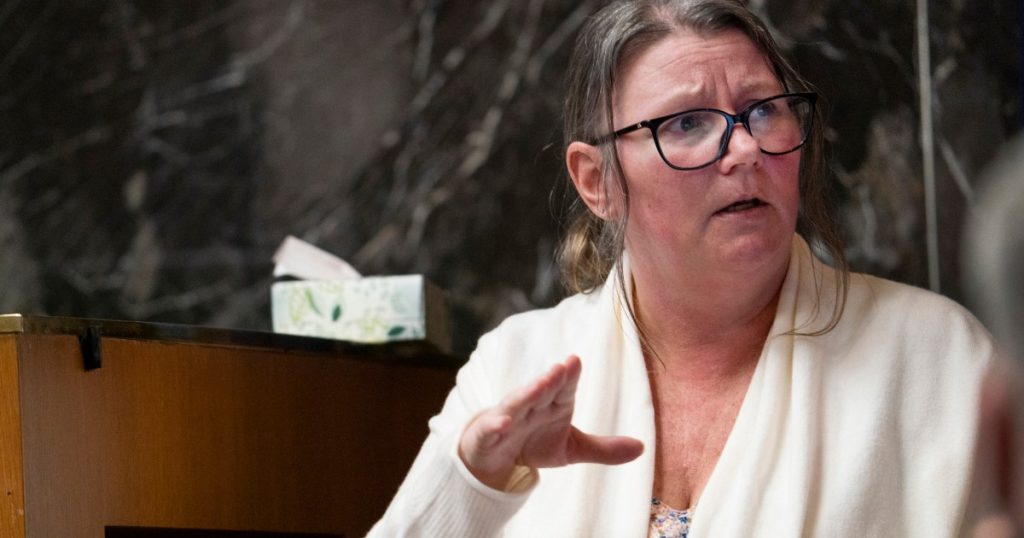School Shooter’s Mother Convicted in Historic Manslaughter Trial
Jennifer Crumbley testifies in an Oakland County, Mich., courtroom, Feb. 1, 2024Mandi Wright/Detroit Free Press/AP
Fight disinformation: Sign up for the free Mother Jones Daily newsletter and follow the news that matters.In a historic decision on Tuesday, a jury convicted the first parent ever to be tried on homicide charges for a mass shooting committed by her child.
Jennifer Crumbley was found guilty of four counts of involuntary manslaughter in connection with an attack carried out by her 15-year-old son Ethan, who murdered four students and wounded seven other people in November 2021 at Oxford High School in Michigan. She and her husband James, who will be tried separately in March on the same charges, gave the pistol used in the attack to Ethan four days before he struck, failed to secure the weapon at home, and appeared to ignore an array of warning signs that their son was turning suicidal and homicidal.
The jury concluded that Jennifer Crumbley was grossly negligent, having willfully or recklessly disregarded a parental responsibility to prevent her son’s devastating actions.
“I’ve asked myself if I would have done anything differently, and I wouldn’t have,” she testified in her own defense—an extraordinary assertion, given the evidence of Ethan’s troubling behavior and deepening crisis leading up to the violence. For months prior to the killings, he had shown signs of paranoia, anxiety, and suicidal despair and had made veiled threats. That culminated with violent drawings he made, found by a teacher the morning of the attack, whose captions included: “My life is useless,” “Blood everywhere,” and “The thoughts won’t stop. Help me.”
When Ethan and his parents subsequently met with a school counselor and dean that morning, just hours before the massacre, the parents did not disclose that Ethan now had access to a weapon. Nor did they agree to take him out of school and get him immediate mental health care, as the school officials had then urged.
The kinds of warning signs Ethan showed are well known to the field of behavioral threat assessment; experts told me when I looked into the case extensively in spring 2022 that the horrific tragedy could have been prevented.
The day before the attack, a teacher had also discovered Ethan looking up ammunition on his phone during class, prompting a school official to call Jennifer. She didn’t respond but instead texted jokingly with Ethan, who assured her what he was doing was “completely harmless.” Their subsequent exchange was bleak in the context of the violence that soon followed:
“Did you at least show them a pic of your new gun?” Jennifer asked.
“NO,” he replied, “I only told them I went to the range with you on Saturday.” He added that he’d been trying to identify a bullet cartridge in his room back home.
“LOL, I’m not mad at you,” she responded. “You have to learn not to get caught.”
When authorities announced charges against the Crumbley parents shortly after their son’s attack, they fled briefly from law enforcement and were quickly apprehended with the help of US Marshals.
Ethan, now 17, pleaded guilty in October 2022 to murder and other charges and is serving life in prison without parole. The toll from his actions included the deaths of fellow Oxford High students Tate Myre, Hana St. Juliana, Madisyn Baldwin, and Justin Shilling.
The trial put on further display grim parental behavior and the deterioration of the Crumbley family as a whole, and yet the judge stated explicitly that the case against the shooter’s mother could not be about her “morality.” Jennifer Crumbley sought during her trial to blame her husband for failing to secure the pistol their son used to injure and kill. There also has been no shortage of debate about how far to go in terms of criminalizing parents for school shootings, however repulsive their actions may seem from a moral or ethical standpoint.
Jennifer Crumbley’s conviction comes as America’s mass shooting epidemic tests new legal terrain in several cases. In November, the father of the Highland Park mass shooter pleaded guilty to misdemeanor reckless conduct for his role in helping his troubled son submit an application to buy firearms. In December, the mother of a 6-year-old boy who shot his first grade teacher at a Virginia elementary school pleaded guilty to felony child neglect and was sentenced to two years in prison.
To some extent, the prosecutions of the Crumbley parents have eclipsed unanswered questions about the role and possible culpability of the Oxford school district. An independent investigation, long delayed, eventually found that the district failed to follow its own threat assessment policy. (As I reported previously, one egregious error was the failure by school officials to inquire proactively about access to guns once they grew alarmed about the perpetrator’s behavior and state of mind.)
Prevention policies generally remain underemphasized and underfunded when it comes to reducing school shootings, even as threat assessment becomes more widely used in public schools. Until this year, Michigan had no safe storage laws to hold gun owners accountable for allowing their weapons to fall into the hands of minors and causing harm.
When prosecutor Karen McDonald first spoke publicly after the Oxford High disaster, she made clear that pouring resources into physical security, active-shooter response, and other reactive measures—still the norm throughout much of America—is insufficient. As she put it then: “We really can’t train ourselves out of this tragedy.”





